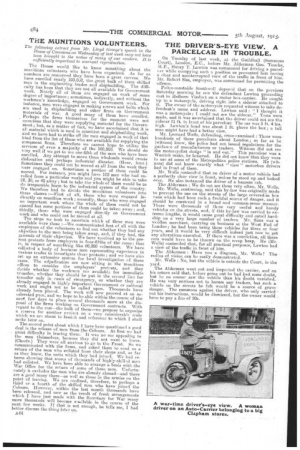THE MUNITIONS VOLUNTEERS.
Page 14

If you've noticed an error in this article please click here to report it so we can fix it.
The following extract from Mr. Lloyd George's speech in the House of Commons on Wednesday of last week may not have been brought to the notice of many of our readers. It is sufficiently important to warrant reproduction.
The House would like to know something about the munitions volunteers who have been organized. As far as n umbers are concerned they have been agreat success. We haveenrolled nearly 100,0u0, the great bulk of them skilled men in the engineering trades and shipbuilding. The diffi culty has been that they are not all available for Government work. Nearly all of them are engaged on work of some degree of importance; sometimes, indirectly, and without the workmen's knowledge, engaged on Government work. For instance, men were engaged in making screws and bolts which are used in shipbuilding and other firms on Government materials of war. A good many of them have enrolled. , Perhaps the firms themselves for the moment were not conscious that they were sopplying material for the Governmerit; but, as a matter of fact, we have ascertained that it is all material which is used in munition and shipbuilding work, and we have had to strike off the men engaged in work of that kind from the list of those who are available for supplying the armament firms. Therefore we cannot hope to utilize the services of even a majority of the 100,000. We should do V.cry well if we get to use one-fifth of the men who have been enrolled. Any attempt to move them wholesale would create dislocation and perhaps industrial disaster. (Hear, hear.) Sometimes they could not be moved at all from the work they were engaged on. Sometimes a portion of them could be moved. For instance, you might have 1C0 men who had enrolled from a particular works and you might be able to take 20, 30, or 90 away ; but to take the whole of them would be to do irreparable harm to the industrial system of the country. We therefore had to divide the munitions volunteers into three classes :—First of all, those who were engaged indirectly on munition work ; secondly, thos..e who were engaged on important work where the whole of them could not be spared but some portions of them could be taken away ; and, thirdly, those who were engaged direatly on Government work and who could not be moved at all.
The steps we took to ascertain which of these men were available were these :—We communicated first of all with the employers of the volunteers to find out whether they had any objection to the men being taken away, and, if they had, the grounds of their objection. We have received up to the present protests from employers in four-fifths of the cases; that is, in respect of -something like 80,000 volunteers. We have collected a body of business men representing experience in various trades to investigate these protests; and we have also set, up an extensive system for local investigation of these cases. The adjudicators. are now sitting in the munitions offices to consider the employers' protests, and they decide whether the workmen are available for immediate transfer, whether they should be put in the second line for transfer only in cases of emergency, or whether they are already engaged in highly important Government or national work and ought not to be called upon. Thousands have already been placed. The work will now proceed at an accelerated pace, and we hope to be able within the course of the runs! few days to place several thousands more at the disposal of the firms working on Government contracts. With regard to the rest—the bulk of them—we propose to organize a reserve for another Oroject on a very Considerable scale which we are about to launch and reference to which I shall mske later on.
The second point about which I have been questioned a good deal is the release of men feom,the Colours. At first we had great difficulty in tracing them. It was no use appealing to the men themselves, because they did not want to leave. (Cheers.) They were all anxious to go to the Front. So we cominimicated with the firms, and asked them to send us a return Of the men who enlisted from their shops and, as far as they knew, the units which they had joined. We had re turns showing that scams of thousands of highly-skilled men had enlisted. We have been able to arrange a basis with the War ,Office for the return of some of these men. Unfortu nately it excludes the men who are already abroad—and there are a good many there—as well as those in the armies on the point of leaving. We are confined, therefore, to perhaps a
third or a fourth of the skilled men who have joined the Co/ours. .However, within the last month thousands have
been released, and now as the result of fresh arrangements which I have just made with the Secretary for War many more thousands will become aea-ilable in the course of the next few weeks. If that is not enough, he tells me, I had better discuss the thing later on.
A44




















